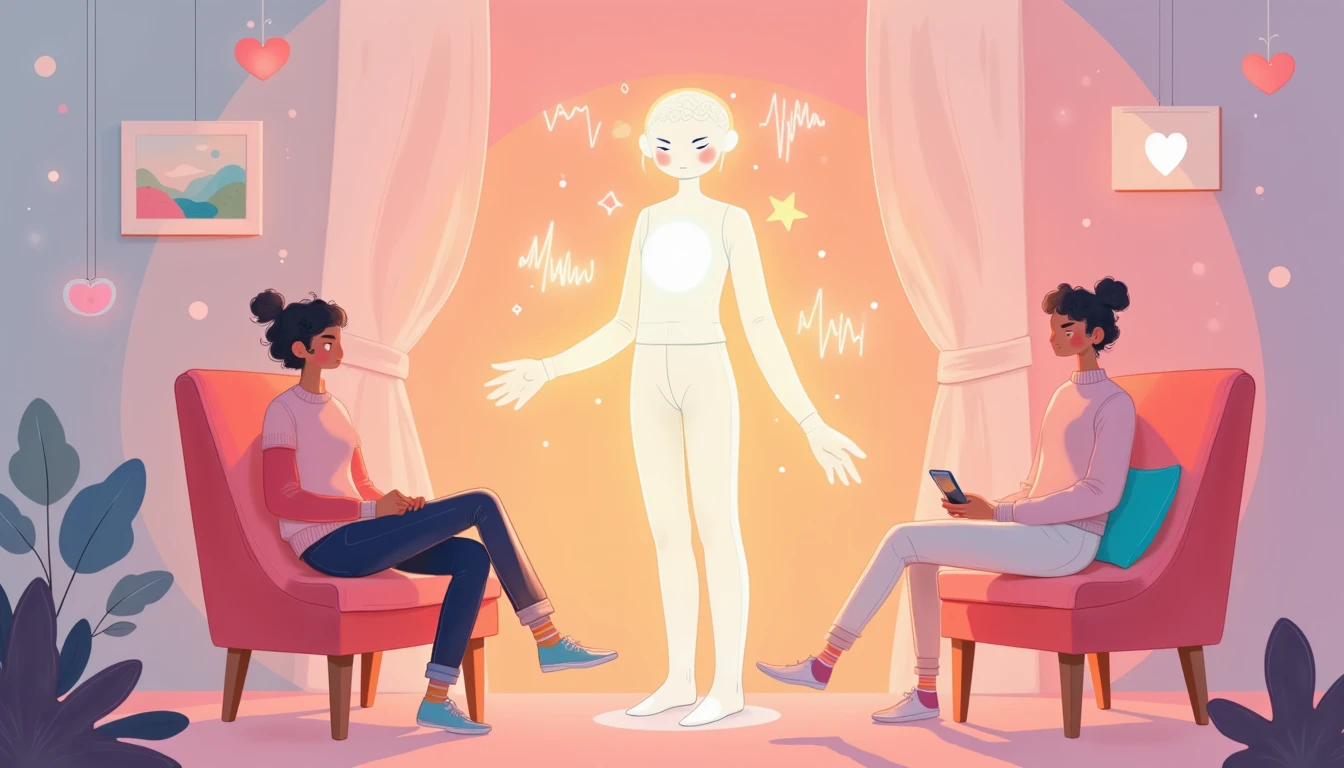Can AI Really Be Your New Therapist
Explore the potential of AI in therapy and learn how it can support your mental health journey with empathy and understanding.
Imagine sitting in a cozy room, sunlight pouring through the window, a mug of tea in your hands. You're about to open up about that swirling storm inside your mind. But instead of a person sitting in front of you, there's a screen. A gentle, understanding voice greets you, asking, "How are you feeling today?" It's an AI, designed to be your therapist. Sounds futuristic, doesn't it? Yet here we are, standing on the cusp of what could be a significant shift in the way we approach mental health care.
Before we dive into this brave new world, let's take a deep breath together. It's okay to feel a mix of curiosity and skepticism. After all, therapy is deeply personal. It's about human connection, feeling understood and supported. Can a piece of technology genuinely provide that? In this article, we'll explore whether AI can be your new therapist, how it fits into mental health care, and what it means for us as individuals seeking solace and understanding.
The Role of AI in Therapy
AI in therapy isn't about replacing human therapists but rather augmenting the mental health support available to us. Let's explore how AI fits into this scenario and what it offers.
AI as a Supportive Tool
Imagine you've had a particularly rough day. You're exhausted, emotionally drained, and just need to talk. But it's midnight, and your therapist isn't available. This is where AI can step in as a supportive tool. AI-based therapy apps can provide immediate emotional support, offering a listening ear when you need it most.
AI programs utilize natural language processing (NLP) to understand and respond to your emotions. Through pattern recognition, they can offer insights and coping strategies. While an AI might not replace the nuanced understanding of a human therapist, it can be a comforting presence, available 24/7. Learn more about how AI Chat Revolutionizes Mental Health Care.
Bridging Accessibility Gaps
Access to therapy is a significant issue. Many people face barriers such as high costs, long wait times, or a lack of nearby therapists. Here, AI can play a vital role by making mental health support more accessible. AI-driven platforms can offer affordable options and reduce wait times, ensuring that more people get the help they need without delay.
By providing services in multiple languages and accommodating various cultural contexts, AI can also bridge the gap for communities that have historically been underserved in mental health care. This can be a game-changer for many, providing a sense of belonging and understanding.

Understanding the Limits of AI Therapy
As promising as AI sounds, it's crucial to understand its limitations. AI is not a magic cure-all, and there are areas where human therapists are irreplaceable.
The Need for Human Empathy
Empathy is at the heart of therapy. It's that warm, non-judgmental space where you can unravel your thoughts and emotions. While AI can simulate empathy through programmed responses, it lacks the depth and intuition of human empathy. A human therapist can pick up on subtle cues in body language, tone, and energy, offering support that AI simply can't replicate.
Think of a time when you shared something deeply personal. The comforting nod, the understanding smile—these human elements can't be encoded into an algorithm. They are deeply rooted in our shared human experience.
Handling Complex Psychological Issues
AI is excellent at providing support for common mental health issues like stress or anxiety. However, when it comes to complex psychological issues such as trauma or personality disorders, AI falls short. These conditions require a nuanced understanding and a personalized approach that only a trained therapist can provide.
It's essential to view AI as part of a broader support system rather than a standalone solution. For complex cases, AI can be a supplementary tool, but human therapists will always be necessary for deeper, more intricate therapy work. Explore more about Understanding AI Therapy For Anxiety.

Ethical Considerations of AI in Therapy
As with any innovation, AI in therapy comes with ethical considerations. It's important to think about these aspects to ensure that AI is used responsibly.
Privacy and Data Security
One of the biggest concerns with AI therapy is privacy. When you bare your soul to an AI, you're entrusting it with sensitive information. Ensuring this data is kept secure is paramount. Users must feel confident that their privacy is respected and protected.
Companies developing AI therapy solutions must adhere to strict data protection regulations and be transparent about how data is used and stored. This trust is foundational to developing a successful AI therapy model.
The Potential for Bias
AI systems learn from data, and if that data is biased, the system can perpetuate these biases in its responses. This is a critical ethical issue, as biased AI could potentially harm users by providing skewed advice that doesn't consider diverse perspectives.
Developers need to be vigilant about the data used to train AI systems, ensuring it represents a wide range of human experiences. This helps create a more inclusive and fair AI therapy experience.
Integrating AI with Traditional Therapy
Instead of viewing AI and traditional therapy as separate entities, consider how they can complement each other. The integration of AI into traditional therapy could open new doors for mental health care.
Blended Therapy Models
Blended therapy models combine the strengths of AI with the expertise of human therapists. In this model, AI can handle routine check-ins and offer immediate support between sessions, while human therapists focus on deeper, more complex issues.
This approach can enhance the therapeutic process, providing continuous support that adapts to your changing needs. It also allows therapists to gather insights from AI interactions, helping tailor sessions to be more effective and personalized.
Empowering Therapists with AI
AI can also serve as a valuable tool for therapists themselves. By analyzing patterns and identifying potential issues early on, AI can provide therapists with insights that inform their practice. This collaboration can enhance the therapist's ability to support their clients effectively. Discover how AI Therapists Vs Human Therapists compare.
In this way, AI doesn't replace the therapist but empowers them to offer better care. By taking on administrative tasks or providing preliminary assessments, AI can free up therapists to focus on what they do best—providing compassionate, personalized care.

Conclusion
As we navigate this new landscape of AI in therapy, it's important to remember that technology is here to serve us, not replace the human connections that are so vital to our well-being. AI offers exciting possibilities for making mental health support more accessible and immediate, but it cannot replicate the richness of human empathy and understanding.
Approach AI therapy with an open mind, considering it a part of your mental health toolkit rather than a sole provider. Like a trusted friend, AI can be there when you need to talk, offering support and guidance. But for those deep, transformative conversations, the human touch remains irreplaceable.
In the end, the question isn't whether AI can be a therapist, but how it can enhance our mental health journey. Embrace the possibilities, stay informed, and remember that the most important element in therapy is you—your courage, your vulnerability, and your journey towards healing.
Frequently Asked Questions
1. Can AI completely replace human therapists?
No, AI cannot completely replace human therapists. While AI can offer support and immediate assistance for common mental health issues, it lacks the depth of empathy and understanding that human therapists provide. AI is best used as a supplement to traditional therapy.
2. What are the benefits of using AI in therapy?
AI in therapy can provide immediate support, bridge accessibility gaps by offering affordable and timely mental health services, and assist therapists by handling routine tasks and providing insights.
3. Are there privacy concerns with AI therapy?
Yes, privacy is a significant concern with AI therapy. It's crucial that the data shared with AI systems is kept secure and that companies adhere to strict data protection regulations to protect user privacy.
4. Can AI handle complex mental health issues?
AI is currently limited in handling complex mental health issues such as trauma or personality disorders. These require a personalized approach and nuanced understanding that only trained human therapists can offer.
5. How can AI be integrated with traditional therapy?
AI can be integrated with traditional therapy through blended models where AI provides routine support and therapists focus on complex issues. This integration enhances the therapeutic process and empowers therapists with valuable insights. Learn more about the Rise Of AI Therapists In Modern Society.
Are you interested in learning programs and a personal AI companion to talk to? Try out MindLumen AI to improve your mental wellbeing with AI therapy and companionship. You can try it out for free.
Get started with MindLumen


